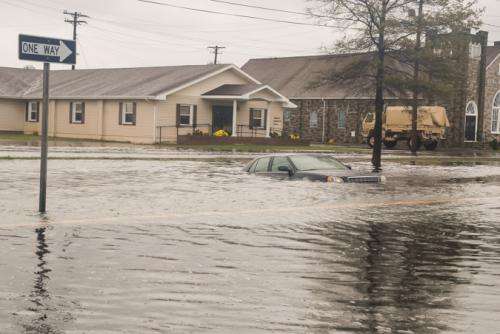UA sociologist studies resiliency in communities devastated by Hurricane Sandy

The disastrous flooding Hurricane Sandy brought to Maryland's coastal communities left a long road to recovery.
An expert in how communities rebound from large-scale disasters, University of Arizona sociology professor Brian Mayer is working to model the relationship between the resiliency of communities and individuals.
The Eastern Shore of Maryland, which lies predominantly on the east side of the Chesapeake Bay, has a centuries-old history of reliance on fishing, crabbing and oystering.
"The Eastern Shore area we're looking at are historic watermen towns. They've been there for 400 years, pretty much doing the same thing they're doing today and their vulnerability is quite high," said Mayer, who is teaming with Lynn Grattan from the University of Maryland on the $417,000 grant, part of an $8 million Health and Human Services project focused on long-term recovery.
A Washington Post report of the damage to Crisfield, one of the communities in Mayer's study, describes a city dock "pounded to smithereens," homes and businesses submerged and vehicles "bobbing like steel buoys in the streets."
"Due to the recession, due to declines in harvesting, that area was already suffering economically and when Hurricane Sandy came around it brought a lot of damage to a particularly vulnerable group," Mayer said.
"What is it about the characteristics of a person, their coping skills, their ability to process information that leads to better mental health outcomes after a disaster? That's individual resiliency and my role as a sociologist is to look at resiliency from a community perspective," Mayer said. "We're comparatively assessing the contributions of individuals to overall mental health and recovery in a community."
Mayer and Grattan are surveying three counties – Somerset, Dorchester and St. Mary's – to collect data on individuals and their social networks in order to advise community organizations and policymakers on the best ways to address the needs and vulnerabilities of the coastal communities.
While the research is specifically related to Hurricane Sandy, the results of Mayer's work could impact the future of coastal communities, in Maryland and elsewhere.
"Hurricane Sandy was the worst to hit, but that area is certainly familiar with disasters," Mayer said. "One of the long-term questions facing the Chesapeake Bay area is sea level rise due to climate change. Their environment has been slowly changing over time. Hurricanes are severe short-term stresses that reveal some of the weaknesses, but they're thinking about climate change and sea level rise and how that will affect their quality of lives in the future and we're hoping some of the lessons we learn about resiliency will have an impact on that."
The research into Maryland communities post-Sandy is similar to Mayer's work studying the socioeconomic impact the 2010 Deepwater Horizon oil spill had on Alabama and Florida Gulf Coast communities.
"Both groups are very dependent on sea food and one of the interesting things we want to learn more about and compare in the two projects is how people recover in a technological disaster compared to a natural disaster," Mayer said.
"One of the things we're learning now is anger directed toward BP continues to be the strongest predictor of poor mental health. In Maryland, we anticipate there will be less anger because generally speaking, it's harder to direct anger at nature. We're very interested to see how recovery and resiliency play out in very similar communities in two different types of disasters."
Provided by University of Arizona















